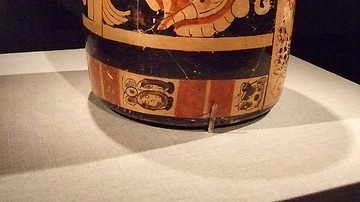Search Definitions
Browse Content (p. 254)

Definition
Xochicalco
Xochicalco in central Mexico was an important hilltop centre from the 8th century CE and was a rival and successor of Teotihuacán. Architecture at the site is closely connected to that of the Classic Maya, Teotihuacan, and Veracruz, and contact...

Definition
Dur-Sharrukin
Dur-Sharrukin (modern Khorsabad, Iraq) was a city built by Sargon II of Assyria (r. 722-705 BCE) as his new capital between 717-706 BCE. The name means Fortress of Sargon and the building project became the king's near obsession as soon as...

Definition
Centurion
The centurion (centurio in Latin) was an officer in the Roman army whose experience and valour were a crucial factor in maintaining order on the battlefield and ensuring Rome's military successes spanned over centuries. A centurion commanded...

Definition
Sargon II
Sargon II (r. 722-705 BCE) was one of the most important kings of the Neo-Assyrian Empire as founder of the Sargonid Dynasty which would rule the empire for the next century until its fall. He was a great military leader, tactician, patron...

Definition
Aedile
The aedile was an official of the Roman Republic who maintained Roman roads, supervised the grain and water supply, and provided the city's citizens with games among other duties. Initially, they were plebeian and elected annually by the...

Definition
Neo-Assyrian Empire
The Neo-Assyrian Empire (912-612 BCE) was the final stage of the Assyrian Empire, stretching throughout Mesopotamia, the Levant, Egypt, Anatolia, and into parts of Persia and Arabia. Beginning with the reign of Adad Nirari II (912-891 BCE...

Definition
Ashur
Ashur (also known as Assur) was an Assyrian city located on a plateau above the Tigris River in Mesopotamia (today known as Qalat Sherqat, northern Iraq). The city was an important center of trade, as it lay squarely on a caravan trade route...

Definition
Marsyas
Marsyas the satyr, or silen, was seen as a mythological founder of aulos playing or a divine judge of it by the ancient Greeks. The way in which his aulos playing enraptured his audience was likened to the way in which Socrates mesmerised...

Definition
Chocolate in Mesoamerica
Chocolate was one of the most desired foods of Mesoamerica and was consumed by the Olmec, Maya, and Aztec civilizations, amongst others. Its consumption even spread via trade routes to other parts of the Americas including the Chaco Canyon...

Definition
Tukulti-Ninurta I
Tukulti-Ninurta I (reigned 1244-1208 BCE) was a king of the Assyrian Empire during the period known as the Middle Empire. He was the son of Shalmaneser I (reigned 1274-1245 BCE) who had completed the work of his father, Adad Nirari I, in...